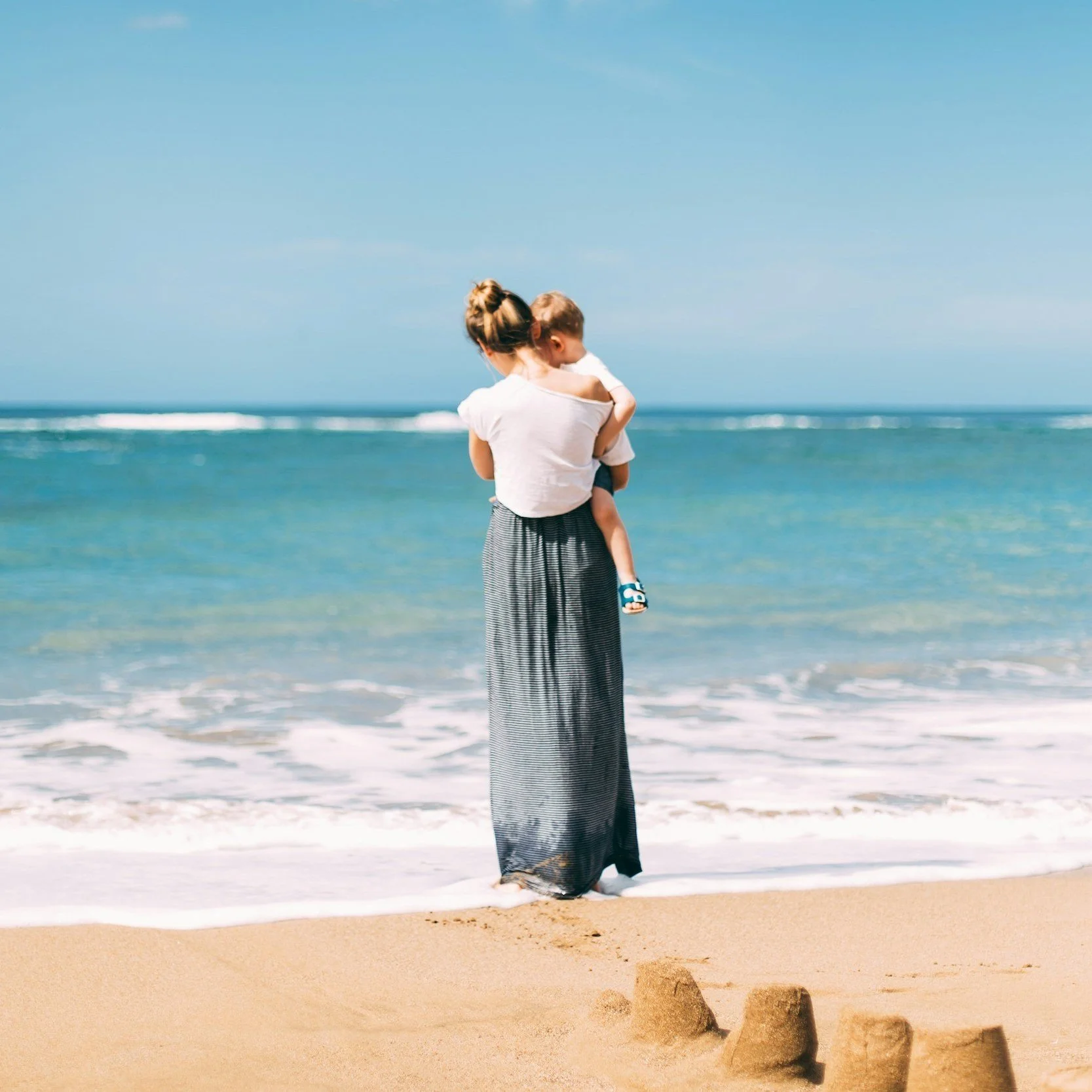Adjusting to Postpartum Life: What New Moms Really Need to Know
Everyone has their own expectations of what motherhood will look like. For many, it is a sweet newborn wrapped in a swaddle sleeping on you. Although there are sweet moments where our expectations meet reality. There are also many moments where the reality of the changes in our life washes over us like ice water.
Becoming a mom is a deeply emotional transformation. While most postpartum conversations center around healing bodies and sleepless nights, the mental and emotional shifts can be just as—if not more—challenging. The difficulty of this season is often heightened due the shame we experience from these shifts. We wonder if there is something wrong with us because of how much we are struggling. This shame often can keep us from speaking up when we need some support.
I hope this blog post will destigmatize the emotions and thoughts that you might be experiencing because the last thing we need when we are struggling is to feel bad because we are struggling.
The Emotional Rollercoaster of Postpartum Life
Postpartum life is full of contradictions: joy and anxiety, gratitude and guilt, love and loneliness. These postpartum emotional swings are completely normal—especially in the early weeks when hormones fluctuate dramatically.
What to Expect:
Tearfulness or feeling overwhelmed (commonly called the “baby blues”)
Guilt over not feeling happy all the time
Anxiety around parenting decisions
Feeling emotionally disconnected from your baby or partner
Postpartum Mental Health - Postpartum Depression and Anxiety
Understanding Postpartum Depression & Anxiety
One of the most important things to understand is that postpartum depression and anxiety symptoms are common, treatable, and nothing to be ashamed of.
Up to 20% of new moms experience postpartum depression (PPD), and many more experience postpartum anxiety (PPA). These aren't just hormonal blips—they are real and they need our time and attention in order for us to get better.
Postpartum Depression and Anxiety Signs:
Persistent sadness, emptiness, or hopelessness
Racing thoughts or constant worry
Irritability or anger outbursts
Difficulty bonding with your baby
Feeling like you're failing, even when you're doing your best
Intrusive thoughts or fears that something bad will happen
If you are experiencing these symptoms, this doesn’t make you a bad mom. It makes you a mom who is struggling who needs some support to fully embrace your new role as a mother. As someone who is a part of this statistic, please know that you will not feel like this forever, and that there is a beautiful future for you and your baby.
Recommended Read: Postpartum Depression: You Are Not Alone
Struggling with overwhelming emotions after birth? You’re not alone—and you don’t have to go through it in silence. This article breaks down the signs of postpartum depression, explores common causes, and shares empowering advice on when and how to seek help. Whether you're a new parent or supporting one, this read offers insight, reassurance, and hope.
👉 Read the full article
Your Identity Will Shift—and That’s Normal
Motherhood can feel like a total identity shake-up. You might grieve parts of your "old life" or feel unsure about who you are now. Regardless it is totally normal to struggle with your new identity after having your baby. I remember having a visit from my family not long after the birth of my second child. After leaving us they were planning on going to a movie I also wanted to see. I remember feeling sad, frustrated, and lonely, because I couldn’t go to the movie. We had just got home from the hospital, and I was still trying to figure out a routine, sleeping, and nursing. It was a blow to recognize that something as simple as going to a movie seemed like an insurmountable obstacle. And it would be for a period of time.
As moms, our lives will radically change after we have a child. We will become more accustom to the change and as our children grow older, the more independence and freedom we will have. But our life will still never be the same. I have found this to be a good thing in my life. Becoming a mother has allowed me to become more kind, compassionate, and patient. Although I still have a long way to go, I don’t believe I would be where I am at today without becoming a mother. I hope you will begin to see this as an exciting next step of your journey rather than an end to who you are.
Ways to Reconnect With Yourself:
Acknowledge that identity shifts are a normal part of any life change, especially when it comes to bringing a new baby home.
Carve out moments to reconnect with your interests or hobbies. It might look different than it did before, but even small moments can help reconnect your old and new identity.
Stay connected with friends. Again, the relationship might look different. It might go from regular dinners to play dates with the children but connection is the priority; however that looks.
Find activities you enjoy doing with your child. This will not be necessarily easy when they are little babies, but it will become easier and more fun as they get older. It might look like going to the park, going to the grandparents house, or going to a children’s museum. Find things you can enjoy with your children as they get older.
The goal is not “getting back to who you were,” but about growing into the mother and woman you were always meant to be.
Why Social Support is Crucial for New Moms
Postpartum life can feel incredibly lonely, especially if you're at home with a newborn while everyone else resumes “normal life.” To excel in being a mom, especially a first time mom, you will need people. You will need people to support you emotionally, physically, and mentally. This might look like: bringing you dinner, helping you clean, taking care of your baby so you can have a date night with your husband, or even simply sitting with you while you cry about the changes in your life. We need people in our live even when life is “simple”. We especially need loving, supportive people when we are going through such a huge life-change.
Where to Find Support:
Join a local or virtual postpartum support group
Postpartum Support International offers free online support groups where you can connect with other parents who understand exactly what you're going through. Whether you're feeling anxious, overwhelmed, or just need to talk, there’s a group for you—no judgment, just real people and honest conversations. They offer a wide range of sessions, including ones for new moms, dads, NICU parents, and more.
Be honest with friends and family about how you're really feeling. Don’t try to look like you have it all together. No one has it all together especially after having a new baby.
Do you have some moms in your life that have a couple of years of experience in being a mom? Reach out to them and see if they would be open to meeting up. Sometimes having someone who has gone through these experiences can be the most encouraging and supportive friend you can find.
Social Media Can Worsen Postpartum Emotions
Limit time on social media if it's making you feel worse. I remember after the birth of my children going through social media and seeing all the cool things everyone was doing. I had a baby attached to me who never slept and cried a ton. Anyone would feel like their life was less than others who are going on vacations and having fun experiences. This comparison trap we can fall in has the potential to only make ourselves feel worse while dealing with all the emotions we are navigating through. Saying “goodbye” to social media during this transition period might be the best thing for your mental health.
Self-care for new moms
Your Needs Matter Too: Self-Care for New Moms
It is such an interesting transition from being pregnant to actually having the baby. While pregnant, everyone is so concerned with you and then as soon as you give birth everyone’s attention goes straight to the new baby. I don’t believe anyone means to intentionally cause harm in this process. I think they just love the sweet newborn, but then they forgot about the new mom who is dealing with sleep deprivation, hormone changes, and difficulty transitioning to caring for a being 24/7. Regardless of how people respond, your well-being is just as important as your baby’s, but only you can make yourself a priority during this process. You must learn to advocate and take steps to meet your own needs. If you don’t, who will?
Postpartum Self-Care Tips:
Ask for help as much as you need it. Remember that guilt as a mom is normal, but the presence of guilt doesn’t mean you don’t deserve the support/help you are asking for.
Create small daily rituals that calm your mind such as journaling, having a cup of coffee, taking a bath, etc.
It is okay to say no to visitors or commitments that drain your energy. You will have less energy than before the baby came, so you must protect that energy in order to care for the things that actually matter.
Give Yourself Permission to Not Be Okay
It is okay to not love every moment with your child! It is okay to be exhausted, emotional, confused—and still be a great mom.
A Gentle Reminder:
It’s okay to ask: “Is this normal?”
It’s okay to cry
It’s okay to need a break
It’s okay to not feel okay
You’re Still a Good Mom Even When You Struggle
Adjusting to postpartum life is an emotional evolution, not just a physical one. As your body heals, so does your mind and spirit—and that takes time, space, and support.
Whether you're crying in the shower, laughing through exhaustion, or staring at your baby wondering what just happened to your life—you're doing better than you think.



